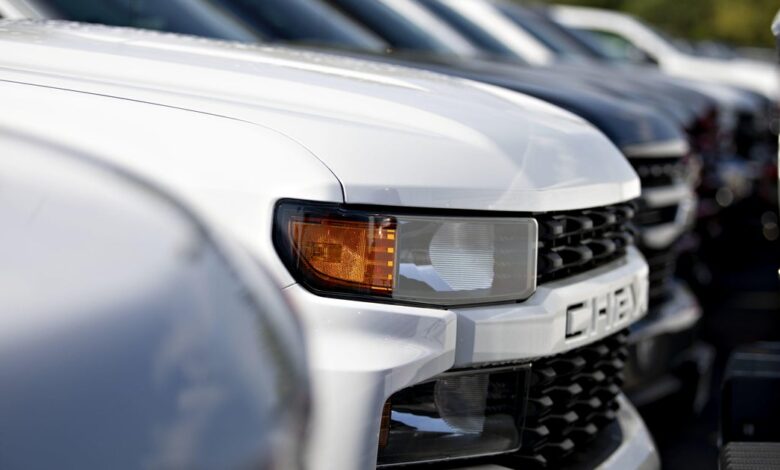Ahead of Trump’s auto tariffs, some U.S. consumers are rushing to buy cars

President Trump’s forthcoming tariffs on automobiles threaten to make cars more expensive, and some consumers are responding by heading to dealerships before the levies go into effect.
Mr. Trump last week announced a 25% tariff rate on vehicles and auto parts imported into the U.S., which are set to go into effect April 2.
The levies will result in higher costs for auto manufacturers, which are expected to pass on at least some of the extra expense to consumers. With car prices expected to rise under the tariffs, experts are advising shoppers in the market for new vehicles to buy them now, in order to avoid paying thousands of dollars more under the auto tariffs.
“Vehicles on lots and the inventory that exists today has not been impacted by tariffs, so it’s a good time to buy a car,” Joe McCabe, president and CEO of AutoForecast Solutions, a provider of automobile industry insights, told CBS MoneyWatch. “It has to fit within the financial boundaries of the consumer, but this would be the preferred time to do it.”
There’s evidence that consumers are following that advice. In a report on first-quarter sales on Tuesday, Ford said buyers flocked to its dealerships, ahead of anticipated increases in car prices.
Retail sales — or direct-to-consumer-sales — rose 5% in the first quarter, driven by a 19% surge during the month of March, the Michigan-based automaker reported. The company did not state outright that the bump was related to Trump’s upcoming tariff announcement.
Burlington, Vermont-based artist Val Hird is among the consumers who rushed to lock in a deal on her vehicle of choice before April 2, which Mr. Trump has referred to as “Liberation Day.”
A day before Mr. Trump announced plans to impose 25% tariffs on vehicles on auto parts imported into the U.S., Hird had decided to purchase a vehicle, she told CBS MoneyWatch.
Hird said she had wanted a Toyota RAV4 Plug-in hybrid, but her local Toyota dealer did not have the car in stock. “I would have ordered one, except we just found out there are going to be tariffs. So, we assumed if it’s not yet in the country, or in transit to the country, that would probably throw it into the ‘who knows what the price will be’ category,” she said of her reluctance to place an order on a new car.
Instead, Hird located a used version of her preferred car model at another dealership in Rhode Island, which she “leapt to the phone” to buy.
She ultimately paid $45,453 for the pre-owned Toyota hybrid. Had that particular model not been available, Hird said she would have forewent the purchase of a car altogether and waited to see how the trade war progressed.
“I don’t live in a world where I can spend an extra $10,000,” Hird said of the anticipated tariff-related price hikes on cars.
Tariff talk at dealerships grows
Analysts say that tariffs are top of mind for consumers, with dealers saying consumers are increasingly weaving talk of the levies into their car-buying conversations.
Data from Cox Automotive, which owns several popular car insight sites, including Kelley Blue Book, Autotrader and Dealer.com, shows a dramatic uptick in car shopping activity in recent days. There was a 27% uptick in visits to Kelly Blue Book Thursday after Mr. Trump announced 25% auto tariffs.
On Friday, users logged 54% more new car leads on Dealer.com, meaning they submitted inquiries to dealers about vehicles they were interested in buying. Auto Trader notched an uptick of 16% in used car leads.
“It makes a lot of sense; I would assume that people would have gotten started researching to see what things look like now,” Erin Keating, executive analyst at Cox Automotive, told CBS MoneyWatch.
More pressure on cost-conscious to buy now
Car prices are all but guaranteed to rise when tariffs go into effect. By contrast, vehicles currently sitting on dealers’ lots are insulated from the levies.
“If consumers are seeing prices on lots saying, ‘here’s the tariff adjustment cost,’ they should challenge that, because sitting inventory is not subject to tariffs,” Aaron Bragman, Detroit bureau chief of Cars.com, a car buying marketplace, told CBS MoneyWatch. He noted that existing inventory is relatively stable. “There are vehicles to be had, we aren’t seeing an inventory crunch right now.”
Indeed, McCabe said dealers are seeing increased interest in vehicles on lots from consumers, and “are going to be more picky on their consumers to get the best price they can.”
Said McCabe, “They know the supply and demand issue will change pretty quickly with the tariff impact.”
That’s why his advice to consumers who need a new car is to start shopping now. “If you need car and can afford it, get out there now,” he said.
In particular, motorists on the lower end of the income scale should consider making their car purchases immediately, he said, because any kind of price hike could push them out of the market for a vehicle altogether.
“There’s a cost-conscious consumer that if you start tariffing them, they’ll stop buying the vehicle because it doesn’t fit in their budget,” McCabe said.




